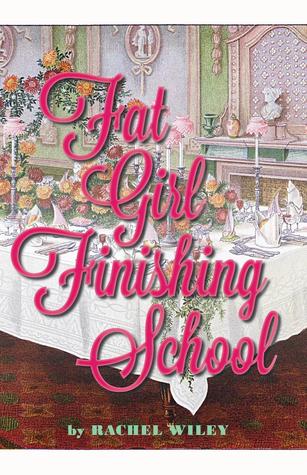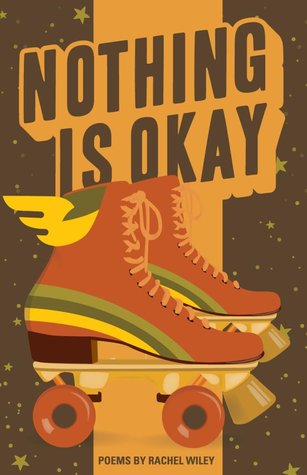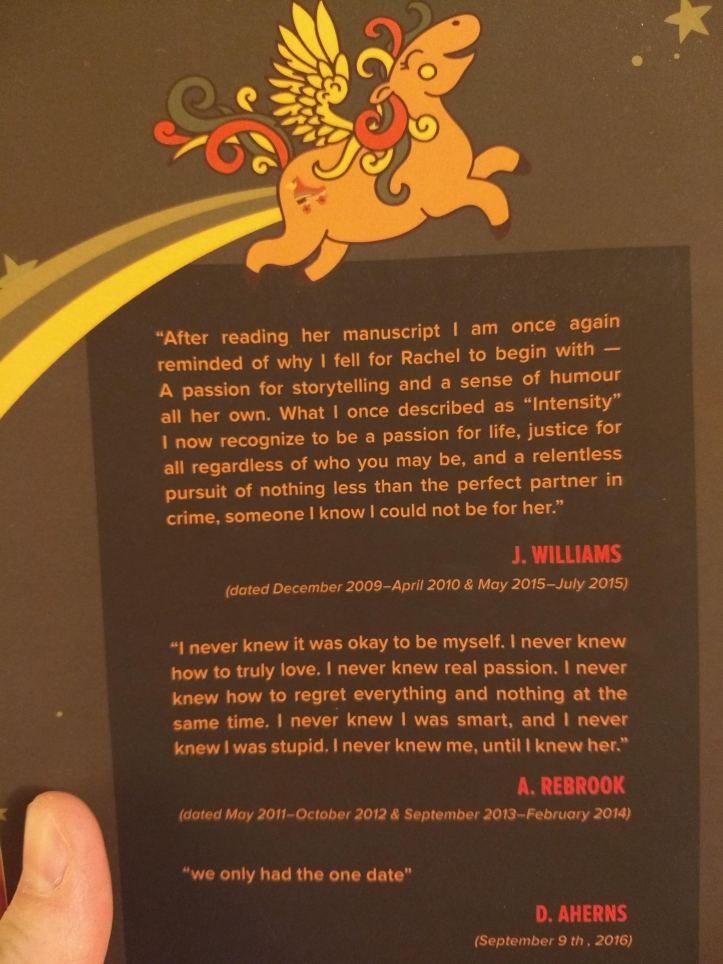Rachel Wiley’s collection of poems Fat Girl Finishing School was just re-released by Button Poetry in June 2020. It was originally published in 2014. I’ve already read and reviewed Wiley’s collection Nothing is Okay, published in 2018, and loved it. What that means, though, is that I’m reading Wiley’s development as a poet backward. The result is while Fat Girl Finishing School was fine, it didn’t light me on fire like Nothing is Okay. Wiley has become a better poet, and that’s worth celebrating. But let me focus on her first collection.

2014 cover 
2020 cover
Poems that were inspired by something get a brief explanation under the title. I appreciate this to the moon and back. I’ve said many times that my pet peeve with poets is when I get their book, I have poems without context. When I go to a public reading, the poet almost always spends time explaining why they wrote a poem, where it came from. If your poem benefits from some brief context, then that context should appear in your book. Here is an example of a poem called “Wife Material” that has the following note under the title:
Maybe I needed to show him I could cook to prove that I am wife material. . . — Stephanie Smith, a blogger who took it as a challenge to make her boyfriend 300 Sandwiches in order to “earn” her engagement ring.
Understanding that a woman felt the need to prove she was marriageable by serving her boyfriend changes this poem from a general feminist cry to something more specific, something directed at one woman’s efforts. Yet, Wiley doesn’t lose a message for all women and the efforts they have made to uplift women in the future. Wiley ends the poem with the following stanza:
Remember that you have that choice because there were women before you who swallowed all of the kitchen knives in order to spare your fingers.
The blend of speaking to one person and to all women effectively narrows in and speaks outward simultaneously.
Another reason context is helpful is because I don’t know everything! I know that the wonderful poetry collection We Want Our Bodies Back by jessica Care moore likely requires some background in black history and arts, which may put readers off. But what I learned in Wiley’s book is that even someone world famous like Yoko Ono may need some context. In the poem “Questions for Yoko Ono When My Love Decides We Need A Break,” Wiley gives the following note: For 18 months in the autumn of 1973, John Lennon and Yoko Ono legally separated. This time period is referred to as John’s “Lost Weekend.” I had not known that Lennon and Ono broke up; in my mind, they were this co-dependent hippy couple that apparently ruined the Beatles with Ono as a 5th wheel. Also, based on Wiley’s note, I’m assuming Lennon did the leaving and Ono did the grieving.
What about the laundry, Yoko? Did you wash and re-hang his shirts so they would be perfect upon his return? Or did you let them fester, take root and bloom a corpse flower full of his scent in case he didn't?
Yet again, this poem about one woman is applied to something bigger, this time Wiley’s own break up. Wiley can’t decide how to separate herself from the everydayness of her ex’s things and lasting presence, so ends the poem with a demand:
Yoko, just tell me what to do with the goddamn laundry.
Wiley is a fat biracial slam poet whose work reflects her experiences with these labels. She includes powerful fat–positive poems, including love letters to her body and other women who won’t shrink in the name of male gaze compliance. But she also writes about the rage of having very light skin, light enough that white friends feel comfortable making racist jokes around her because they think she’s white, too, only for her to explode with anger at having the “privilege” of being “in” on a joke that first requires the speaker to look over their shoulder.
As a young queer woman, her love poems are about dating women and men, and how when she published the collection originally she was twenty-five, meaning she was navigating conversations about possible parenthood. Although some of the poems utilize clever imagery and calls back to earlier parts of itself (like the laundry in the Yoko Ono poem), many read more like narrative prose poems broken into lines, causing me to ask why the line breaks mattered or what they added to the reading experience. A fair collection, though I would recommend the more artistically mature Nothing is Okay.



Even just in excerpts, that poem about the laundry is gutwrenching. Yes to the importance of context in understanding poetry – sometimes it’s very obvious (this is a lot of what I like about Wendy Cope, who just tells you straight off what the poem is about in the first couple of lines), but often it’s difficult to interpret.
LikeLike
I got this book from Button Poetry, the same place at which you purchased your recently reviewed poetry collection. I enjoy their stuff so far. It seems interesting, smart, and accessible.
LikeLiked by 1 person
I haven’t read much poetry this year but am working (slowly) through a collection called A Bound Woman is a Dangerous Thing. I’m glad you enjoyed reading this poet in reverse order and appreciate the context being added!
LikeLike
I think I’ve heard of the collection you’re reading!
LikeLike
Oohhh I love the context!!! Knowing those little snippets really does put you ‘in’ the know, so you feel like you have a deeper layer of understanding. Like, I get why certain poets don’t do it, they probably want people to take whatever they feel out of it, but I do appreciate that background knowledge 🙂 Also, i love that new cover, the cake looks yummy…
LikeLike
I feel like poets not including context is why most Americans don’t read poetry. Nobody wants some vague, pretentious-sounding drivel that could easily be cleared up when we realize something simple, like “Oh, this dude broke up with his girlfriend so this poem is a metaphor to his sad penis,” or something like that.
LikeLiked by 1 person
yes exactly!!!
LikeLiked by 1 person
I’ve completely fallen out of touch with the poetry world since college, and at some point I’d like to do a deep dive return, but I don’t think I’m quite there yet. I do really like the excerpts you’ve included though, so I’m happy to have this writer on my radar- those kitchen knives being swallowed make for a GREAT line, I’d love to see what else Wiley can do at some point! And perhaps if her second collection seemed like an improvement, her third will be even more impressive. Great review!
LikeLiked by 1 person
Lol, I would just like to echo the sentiment of having fallen out with poetry after college and not feeling quite ready to return. 🤣
LikeLiked by 1 person
Ah! Check out the comment I wrote back to Emily.
LikeLiked by 1 person
I would totally recommend Nothing is Okay as the book to choose. Button Poetry seems like the kind of press that publishes smart yet accessible poetry. It’s not the dense, abstract stuff that needed a phamphlet to explain the poet’s idea that I read in college. I mean, people wonder why Americans don’t read poetry, and I think because a lot of modern poetry doesn’t speak to Americans. There used to be a time when presses like Broadside Publishing put out books that could fit in your back pocket because their stuff energized average Americans, who would carry these poetry books to work and read them on break.
LikeLiked by 2 people
Thanks for the recommendation. I did like most of what I had to study in college for poetry, of all varieties, but it was definitely easier when I had classes to help me dissect possible meanings I may not be picking up on my own. I have a lot of respect for how condensed poetry can be (I CANNOT write that way, so I am envious) but you may have a point with people wanting to pick it up more if it speaks to them. I don’t mind digging for meaning, but I would probably reach for it more often if I connected to it more easily. I’m glad to have a good press with accessible stuff on my radar!
LikeLiked by 1 person
Sounds like a great collection—I especially love that she adds context to her poems! Sometimes I feel dumb when I don’t get allusions in a poem, like I’m not in on the joke, so this format feels more considerate to readers. Intriguing tidbit too about John and Yoko—I was never aware that they broke up.
LikeLike
Right?! Who knew?? And it sounds like he left, which, dude. Don’t be the person who leaves and comes back. Make a decision!
LikeLiked by 1 person
I love the excerpts you’ve included – they’re very powerful, but they also feel accessible to me (which is not always a given for me with poems). And LOL at Yoko Ono being the 5th wheel who caused the Beatles to break up – I always thought that too!!
LikeLike
I think she was notoriously hated for “changing” John Lennon, as if he didn’t have any say in how he conducted himself or what he did with his art. I’m sure she influenced him deeply. She was part of this wacky movement called Fluxus.
LikeLiked by 1 person
Ohhh I just did a quick search on Fluxus and it’s really…out there, wow!
LikeLike
The only reason I know what it is is because in my second semester of my MFA program I hated every lit course offered and so did an independent study that somehow took me from “read all the poetry” to “what if you put on a fluxus exhibition”?
LikeLiked by 1 person
Did you put on a fluxus exhibition?!
LikeLike
It was my final grade in the class. It was re-donk-u-lous. I had people trying to read the same poem at different speeds, people who ripped up paper into tiny little pieces for about 10 minutes on stage and the threw a whole bowl of the pieces at the audience and yelled “SNOW!,” I had a lady get undressed and put all of her clothes on a guitar, etc.
LikeLiked by 1 person
I really like that she gives context for the poems. That isn’t something that necessarily bothers me when I read poetry but you’re right that at a reading the poet often gives background.
Ugh, I’d forgotten about that 300 Sandwiches couple.
LikeLike
I want to say that I think I remember the 300 sandwiches couple. Did he know what she was doing?
LikeLiked by 1 person
I’m fairly certain he did. If not from the beginning, he definitely knew by the time people started reading her blog. I remember reading about them when she was still in the middle of making the 300 sandwiches and in the picture he just had this smug face and I remembering thinking, There is no way this guy is worth this. I wonder if they ever got married.
LikeLiked by 1 person
OMG, they’re married and have a baby.
LikeLiked by 1 person
Yikes. I can’t decide if I hope that baby is a boy or a girl. Maybe they’ve sorted themselves out and have a super healthy relationship now and never eat sandwiches?
LikeLike
I hope that baby is a bird and it can fly far. Far, far away.
LikeLiked by 1 person
So I’m going to be up front and say poetry is not really my thing, but now that you bring it up I wonder if it’s because I’ve never had any context. These snippets were awesome! I especially like the one about the 300 sandwiches, because reading the part about 300 sandwiches made me face palm. Thanks for sharing!
LikeLike
I can’t believe the 300 sandwiches story is real, but the lady who committed after her boyfriend after he said she was about 300 sandwiches away from a ring still has her blog. They’re married and have a baby.
LikeLiked by 1 person
UGH. I’m sort of disgusted all the way around. “Earning a ring”? Gross.
LikeLiked by 1 person
I’ve never considered the context of poems helping that much. I’ve never been to a reading, I’ve only read and listened to poetry in book form and I’ve never seen any sort of introduction for individual poems, only the collection as a whole. I wonder if I’d like poetry more with this context? Probably. I like understanding things. I’m a very curious person.
Do you happen to know if there were any revisions with this reprinting? I love the new cover — the cake makes me super happy. It’s just so fun!
LikeLike
There was an introduction by the author added, but I’m not sure to what degree she revised any poems. I would assume so, because I believe there are also new poems added.
As far as context goes, you can get the most abstract, weird-ass poem that makes no sense, but the minute the poet says they were sitting on the deck, drinking mimosas and wondered if deer like alcohol too, and that’s where this poem came from — YOU TOTALLY SEE THE CONNECTIONS. But don’t give me a drunk deer abstract poem and expect me to get it on my own, ammiright?
LikeLiked by 1 person
PLEASE tell me there is actually a poem about if deer like alcohol too. If not, you probably need to write one and become famous off of it. ❤
LikeLike
I mean, there are loads of odd poems that make you think, “WTF?” I’ve read many an ode to the poet’s penis, unfortunately.
LikeLiked by 1 person
WHAT. No. Wait. Really? WHY
LikeLike
Because men.
LikeLiked by 1 person